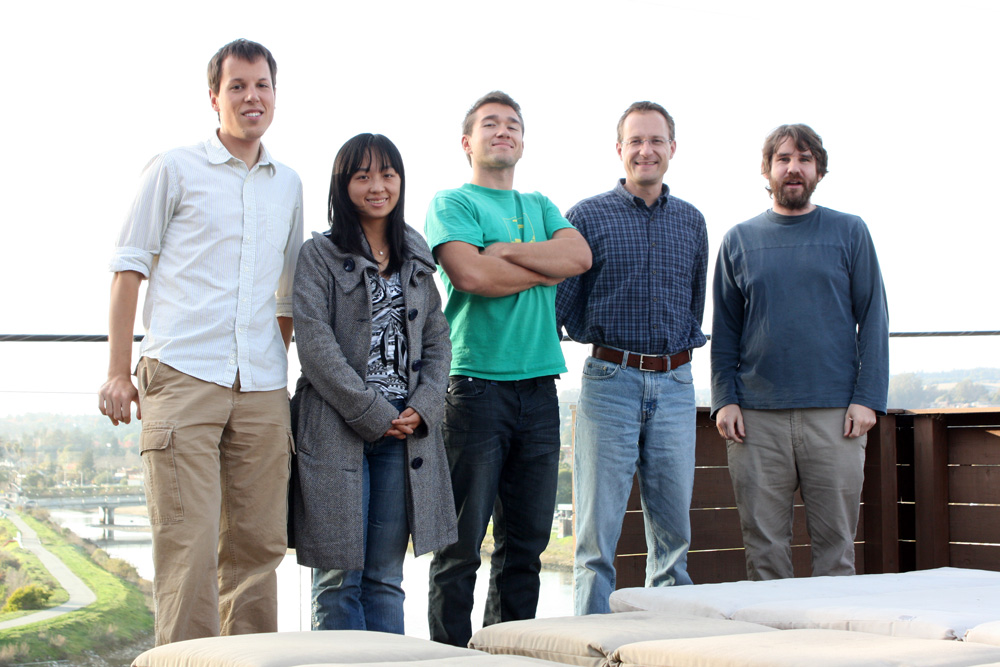(Article contributed by Drew Dara-Abrams)
“Howdy!” During three days together at a Santa Cruz beach house, that catchy greeting became the watchword of the Spatial Cognitive Engineering Lab (a.k.a. the SpaCE Lab) on our first annual lab retreat. It’s always somewhat presumptuous to say “first annual,” but this mix of research discussions, brainstorming sessions, breakfasts and barbecues, awfully stupid DVD movie nights, and creative attempts to work “howdy!” into any and all conversations led us all to agree that this is a combination worth repeating again.
The SpaCE Lab, led by Prof. Martin Raubal, studies and develops spatio-temporal services with users in mind. At our retreat, sprawled on couches and beanbag chairs, each with a laptop and with a fire burning beside the projector screen, we discussed projects including:
- Martin’s studies of cognitively ergonomic route directions–that is, navigation systems that generate route directions designed with the user in mind rather than the underlying system. Instead of including overly exact distances (“drive 423 meters”), Martin’s approach uses landmarks and other more understandable details (“turn left at the large yellow building”). Another ongoing project of Martin’s is shared-ride trip planning. Using agent-based modeling and other computational approaches (think the Sim City and the Game of Life), Martin and his collaborators are developing distributed communication systems that allow people in need of rides and people with extra seats to find each other. Martin is also evaluating how the same algorithms can be applied to other situations, such as when emergency responders look for optimal routes.
- Michael McDaniel, a master’s student in the lab, wasn’t able to join us because he was in the final phase of completing his thesis, but we did discuss his research on agent-based modeling of lost person wayfinding, as well.
- Edward Pultar’s studies of CouchSurfing, an on-line service that connects travelers and hosts with a couch, bed, or floor space to share. Ed’s doctoral research is combining an ethnographic study of the CouchSurfing community with computational analyses of the social networks, transportation networks, and other geographic networks that the users move and connect through.
- Ben Adams’ research on conceptual spaces, a geometric and topological approach to knowledge representation designed to add semantic expressiveness to the semantic web. Whereas traditional knowledge representation systems describe concepts in terms of logical propositions, conceptual spaces represent concept as n-dimensional regions in multi-dimensional spaces. His research has practical applications in geospatial information systems that require semantic similarity measurement, such as geospatial data conflation.
- Christoph Wosniok, a master’s student in the lab, couldn’t fly out from Germany to join us, but we also discussed his research applying Ben’s software to represent surf spots around California.
- Yihong Yuan’s studies of how information and communication technology affect human activity travel behavior. Yihong is working with a large data set of georeferenced cell phone calls in China. She is using computational analyses to identify ways in which patterns of communication affect the how far and to where people travel.
- Drew Dara-Abrams’s studies of human spatial cognition. As the token psychologist in the group, Drew is considering both how geotechnology can be developed to assist people’s cognition and also the mental processes and abilities that people use to navigate and acquire spatial knowledge with or without the technology. In his dissertation, he is creating a distributed system called Cognitive Surveying that uses smart-phones to track people’s travel patterns and prompt them with questions about their spatial knowledge. And using the Cognitive Surveying system, he is running large behavioral studies of how people learn their way around new cities.
We’ve now adjourned for the holidays, but when all the SpaCE Lab’ers return for 2010, we will be following up on all our new plans for research projects, publications, grant applications, lab lunches, and perhaps even t-shirts with a large “howdy” across the front. All five of us are also submitting papers to next year’s GIScience conference, so we look forward to another opportunity to work and chat in an exotic location (Zurich!) and perhaps see you there as well.




